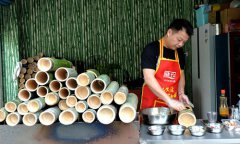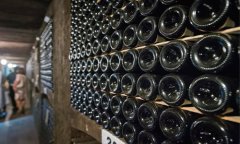
Enlarge this image
In hotter temperatures, cabernet grapes lose their rich red color and produce sweeter, more alcoholic wines. Ryan Kellman/NPR hide caption
toggle caption Ryan Kellman/NPR
In hotter temperatures, cabernet grapes lose their rich red color and produce sweeter, more alcoholic wines.
Ryan Kellman/NPRClimate change is affecting our food, and our food is affecting the climate. NPR is dedicating a week to stories and conversations about the search for solutions.
In Napa Valley, the nation's unofficial wine capital, one varietal reigns supreme: cabernet sauvignon.
It's one of the most popular red wines in the world. Its fruity complexity and full-bodied flavor make it well known among wine nerds and newbies alike. But climate change is threatening the small blue-black grapes for which cabernet sauvignon is named. Increasingly severe heat waves are taking a toll on the grape variety, especially in late summer during ripening.
Sponsor Message
Unlike its French counterparts that blend a variety of cabernet and non-cabernet grapes to create wines with the Bordeaux label, American cabernets are mostly monovarietal.
They're legally required to be.
When the wine industry first began in the United States, American wines didn't have the prestige of European "Old World" ones. So, winemakers opted to using the grape it was made of — rather than the region it came from.

Enlarge this image
In a lab at the University of California, Davis, a member of Elizabeth Forrestel's research team crushes grapes. Forrestel is studying how the compounds in cabernet grapes react to heat. Ryan Kellman/NPR hide caption
toggle caption Ryan Kellman/NPR
In a lab at the University of California, Davis, a member of Elizabeth Forrestel's research team crushes grapes. Forrestel is studying how the compounds in cabernet grapes react to heat.
Ryan Kellman/NPRMore frequent, more extreme heat waves are causing American farmers to rethink that strategy. In order to maintain the taste, quality and color of cabernet, some are considering blending more heat-resistant grape varieties into their wines. Others are installing new technologies like water misters to cool the grapes in the field.
Either way, it's clear that climate change is forcing farmers to adapt. What's less clear is how the industry as a whole can move forward.
Interested in hearing more climate solutions? Email us at [email protected] – we'd love to hear your ideas!
Listen to every episode of Short Wave sponsor-free and support our work at NPR by signing up for Short Wave+ at plus.npr.org/shortwave.
Listen to Short Wave on Spotify and Apple Podcasts.
This episode was produced by Hannah Chinn and edited by Rebecca Ramirez. Tyler Jones checked the facts. James Willetts was the audio engineer.
red wine
farming
climate change and food









